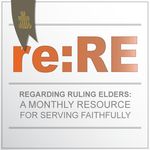Take a survey of ruling elders and you will probably find that many have served on nonprofit boards. This important work takes a certain skill-set and dedication to a mission. Because of this, one might think that serving as a ruling elder in the Presbyterian Church (U.S.A.) is not much different. Many ruling elders view their leadership in terms of serving on the session, managing the financial business, and running the operations of the church. Elders have a clear sense that their role is functional; they are less clear about the identity they assume as they answer the call to serve in ordained office.
The session is not a board, and elders are not board members. The call to ordered office in the PC(USA) is a call to spiritual leadership. Our Book of Order defines ruling elders as persons called to discernment as well as governance. It is a lifelong calling, not a term of office. These two elements of leadership—discernment and calling—differentiate being an elder from any other kind of service.
Some ruling elders embrace spiritual leadership, while others shy away from it. They see it as the pastor’s role. The pastor is a professional with seminary training, after all. Perhaps one of the reasons ruling elders do not view themselves as spiritual leaders is that they have an idealized understanding of what spiritual leadership is.
What Is a Spiritual Leader?
Simply put, spiritual leaders are leaders who follow the Spirit. They seek the Spirit’s leading in all things, and make their decisions based upon what God wants instead of what they want or what is popular. How do ruling elders know what God wants? They ask, and they take time to listen for the Spirit’s guidance. This is what is meant by discernment.
Spiritual discernment is seeking God’s will. For ruling elders, this means coming to the session meeting with hearts and minds open to what God is doing. Discernment is God-centered and bathed in listening prayer. We know God’s will because we witness it in the life and wisdom of Jesus in Scripture, and the ongoing presence and work of the Spirit. As Joan Gray writes, discernment is “not a game of hide-and-seek with God hiding and us seeking.”[1] It is listening and watching for God’s activity and joining in God’s mission and ministry in the place and time we are.
For many, the issue is not that we cannot discern God’s will in a particular situation. More so it is that we are afraid to join God in what the Spirit is doing, or we simply do not want to because it requires more of a sacrifice than we are willing to give. This is when it is imperative that spiritual leaders be willing to “take up the cross and follow.” Spiritual leadership implores us, even requires us, to seek and follow God’s will even when it is uncomfortable or scary.
What is the difference between being a ruling elder and being a board member? Ruling elders are called to give their lives and their wills to the living God. There is nothing self-glorifying about ordained office. It is a humbling and awesome responsibility and privilege.
The Reverend Dr. Peggy Hinds, ACC, is a professional coach and consultant who assists churches and congregational leaders to discern God’s will for their present and future ministries. She is a teaching elder and certified Christian educator. You can learn more about her ministry at www.linkedin.com/in/pchinds.
Read Peggy Hinds’ first article on ruling elders serving as spiritual leaders here. For more about the information provided here, please contact Martha Miller at martha.miller@pcusa.org and browse the Ruling Elders website.
[1] Spiritual Leadership for Church Officers: A Handbook, Gray, Joan S., Geneva Press, Louisville, KY 2009, p. 88.
Read this post in 한국어.

